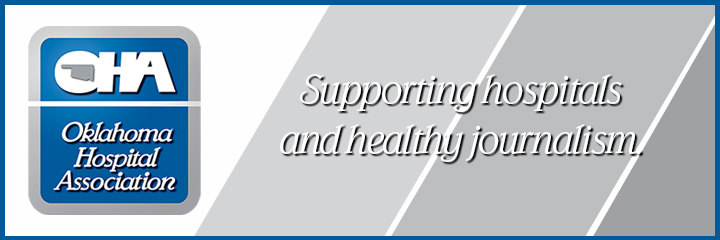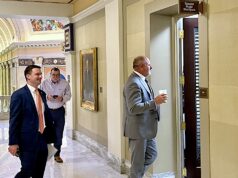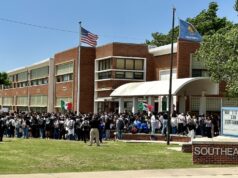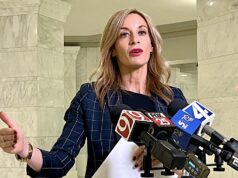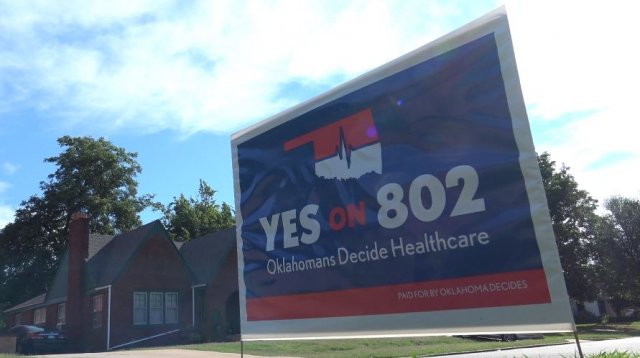

As Oklahoma’s 2020 election arrives today, tribal officials are looking toward the passage of State Question 802‘s Medicaid expansion proposal to address the denial of health care to their members and other disparities exposed by the ongoing COVID-19 pandemic.
Oklahoma is one of 14 states that has not yet expanded Medicaid under the Affordable Care Act, according to the Centers for Medicare and Medicaid Services. That fact is having dire effects on the level of tribal care provided, leaders say.
This story was reported by Gaylord News, a Washington reporting project of the Gaylord College of Journalism and Mass Communication at the University of Oklahoma.
SQ 802 asks voters to vote on expanding Medicaid expansion through a state constitutional amendment and provide eligibility to those whose income is 133 percent of the federal poverty threshold or below, or $17,000 or less for one individual.
“Unfortunately, we have to defer or deny care that’s needed if it’s not life or limb sort of care,” said Melanie Fourkiller, a senior policy adviser with the Choctaw Nation Office of Self-Governance. “Very often we may have to defer that kind of care just because a heart attack, a stroke, something more immediately life threatening has to be paid for.”
American Indians make up 10 percent of the uninsured population in Oklahoma, Fourkiller said.
“Oklahoma has the largest by far uninsured American Indian population of any state,” she said.
Some Oklahoma tribes, such as the Muscogee (Creek) Nation, are openly supporting passage of the medicaid expansion proposal.
“When you look at the hospitals throughout rural Oklahoma, they’re the lifeblood of many of these communities,” said Shawn Terry, the Muscogee (Creek) secretary of health. “And if these hospitals go away, there is no emergency room to go get a COVID test. There is no place if you’re having a heart attack to go have someone save your life. There is no place to go if you have a stroke.”
The COVID-19 pandemic is bringing large amounts of funding to tribes, including more than $1 billion to the Indian Health Service from the Coronavirus Aid, Relief and Economic Security Act, and $64 million from the Families First Coronavirus Response Act.
But it’s also revealing the disparities in preventive care within Indigenous communities as the virus spreads across the country and impacts Oklahoma. Part of this includes a lack of adequate health coverage through Medicaid, Medicare and private insurance.
“A certain percentage of our population has nothing. They fall outside of the Medicaid eligibility or they’re too young for Medicare,” Terry said. “That number varies anywhere between 20 to 25 percent at times.”
Medicaid expansion seen as only option
The long-awaited ballot measure received 313,000 signatures last fall, the highest number collected for any initiative petition in state history, according to Amber England, campaign manager for Yes on 802.
“Year after year, politicians come up with some excuse why they’re not going to do it or they can’t get it across the finish line,” England said. “Oklahomans are really tired of not seeing any action.”
The effects of not expanding Medicaid in past years can be seen in the quality of services tribes can provide. Services provided by the IHS depend on the “level of need funded”, or the amount of funding and resources available; resources that include Medicaid.
“Continuing to expand Medicaid helps us bring revenue back into the tribe where we can go out and build new buildings on our own or expand services that way,” Terry said.
The only current alternative to expanding Medicaid is a plan created by Oklahoma Gov. Kevin Stitt. The plan would grant the state more discretionary power for how to expand Medicaid through the Healthy Adult Opportunity, a new waiver opportunity from the Trump administration to permit states to manage how they will handle the expanded Medicaid adult population.
“With SoonerCare 2.0, we will achieve what Oklahomans are asking for, and we will fund it through efficiencies and accountability reforms, protecting Oklahomans from new taxes,” Stitt said in a press release when the plan was announced in late January.
But Stitt vetoed legislation that would have provided much of the funding needed for his plan, stating it “does not fully fund SoonerCare 2.0 in year one. And it did not consider funding for year two.”
The governor’s veto makes proponents of SQ 802 more determined to ensure its passage.
“What we believe is that the only viable path to Medicaid expansion in the state right now is State Question 802,” England said.
“Illness doesn’t know a political party. Illness doesn’t care what town you live in. And so when a crisis like this is in front of you, for folks who don’t have insurance, it just makes navigating a pandemic that much harder,” she said.
Stitt has spoken openly against SQ 802, as has former Gov. Frank Keating, many Republican members of the Legislature and leading conservative groups like the Oklahoma Council of Public Affairs and the Oklahoma chapter of Americans For Prosperity.

